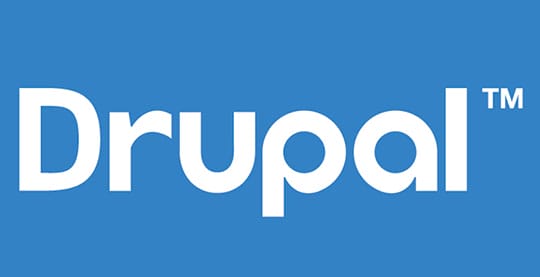Article Note: This article “10 Strong Points That Make Drupal Good for Web Development” was first published on January 29, 2021. We last updated this article with fresh information on April 6, 2023.
One of the most well-known CMSs available on the market for free is Drupal. Drupal is an open-source CMS platform that enables users to develop powerful and scalable web solutions. Its modular architecture, active community, and security features made it popular among developers. Nowadays, it is one of the best for web development, so many state establishments, large-scale associations, non-profit organizations, and even companies from the Fortune 500 list build their sites on Drupal.
This content management system is easy for developers, safe, and accessible to customers, which makes it a universal choice for any business. It allows developers to create a wide range of websites, from simple blogs to complex eCommerce stores, ensuring scalability and security. This robust CMS platform can help you serve a global audience with multilingual support.
How Drupal managed to gain such popularity and what makes it special? Read the advantages of Drupal below. Keep scrolling the page to understand what makes Drupal the best fit for making secure and scalable websites or web apps.
Who Uses Drupal?

You can take your digital presence to legendary heights with Drupal. This CMS powerhouse is trusted by big names like General Electric, The Economist, and eBay, as well as global government agencies, charitable organizations, and universities. And it’s not just about the clout – Drupal is the perfect match for complex websites with tons of content and traffic. Plus, Drupal developers have proven time and time again that it’s the best platform for creating ambitious digital solutions that pack a performance punch. Get ready to soar with Drupal!
Julia Dashchenkova, the project management department head of Gole.ms, sheds light on the buzz surrounding the newest version of Drupal in her latest blog post. According to her, “Drupal 8 is currently the talk of the town, with an abundant supply of resources readily available for its configuration. However, it’s the release of Drupal 9 that has everyone’s attention. With little information and practical experience out there, curiosity and anticipation for this latest iteration are at an all-time high.”
Recommended for you: Magento Development: The Best Practices and Useful Tips.
Key Advantages that Make Drupal Perfect for Web Development

The reason why Drupal is such a popular CMS is that it can evolve with your needs. You can start with a very simple corporate site and gradually add the required functionality (e-commerce, catalogs, rating systems, etc.). As the business world increasingly depends on the speed of decision-making, your ability to change your development priorities and set some new directions – that’s what we consider one of Drupal’s main advantages. Now, let’s look at the key features that make Drupal extremely popular for web development:
1. Modular Architecture with a Large Library of Modules

Drupal has a modular architecture, meaning you can add or remove features as needed. This makes it easy to customize your website and add new functionality without affecting other parts.
The modular architecture of Drupal consists of the following components:
- Core modules.
- Themes.
- Libraries.
- Custom Modules.
Drupal sites have a wide range of customization options. This content management system has a large community of users where thousands of developers contribute to the library of modules.
Its modules include a wide range of site features like:
- For social networks – ShareThis.
- For photo editing – Image Effects.
- Plugins for the calendar.
- CAPTCHA.
- GA.
- Plugins for meta tags.
The advantage of upgrading to Drupal 9 has resulted in easy and even better integration and usage of add-ons. There are currently thousands of free modules available for any website you can imagine.
2. Localization Capabilities with Multilingual Support

The superior advantage of Drupal is its localization capabilities. Drupal 9 has fantastic international capabilities. One can add geolocation features, such as making content or navigation links available only in certain countries. For example, you can publish different content for customers from the United States and Canada. Drupal provides the widest opportunities for the localization of everything that is on the site.
Drupal’s multilingual capabilities make it an excellent option for websites that cater to a global audience. With its four built-in multilingual support modules, users can seamlessly browse your website in their preferred language. Say hello to a more engaging user experience that transcends language barriers! Let’s see these 4 modules that Drupal offers:
Configuration Translation Module
Have you ever needed to create a website with multiple language options? The Configuration Translation module is here to save the day! This handy Drupal tool lets you easily translate configuration settings into different languages. It may not be visible to end users, but website builders will definitely appreciate its usefulness in creating a multilingual and user-friendly website.
It also supports importing and exporting translations, making it easier to manage translations across different sites or environments.
Content Translation Module
It lets you translate content entities and types like blocks, comments, taxonomy terms, custom menu links, etc.
Moreover, it supports translating content like pages, articles, blog posts, and others. This Drupal module allows you to create translated versions of this content so that users can view it in their preferred language.
Interface Translation Module
It is a core module of Drupal 8 and Drupal 9. This Drupal module provides support for translating the user interface (UI) of Drupal. The UI refers to the text labels, buttons, menus, and other elements users interact with when using the site.
The Interface Translation module allows you to translate these UI elements into different languages, making it easier for users who speak different languages to use the site.
It is worth noting that the Interface Translation module only translates the UI elements of Drupal itself. It does not translate the content on your site, which requires using the Content Translation module or other similar modules.
Language Module
This Drupal module supports creating and managing multilingual websites. It lets you define and manage languages. It configures how your site handles language-related functionalities.
The Language Module is a crucial tool for creating a website that can speak virtually any tongue. Without it, your multilingual dreams will remain just that: dreams. With this module, you’ll finally have the power to configure your site’s default language and add new ones as needed. It’s like having a universal translator built right into your website!
If you’re looking to expand your reach and ensure that all visitors can comfortably access your content in their native language, then you’ll want to get your hands on the Language Module ASAP. And if you’re unsure where to start, then don’t hesitate to reach out to a Drupal development team for expert guidance.
You may like: 10 Reasons to Opt No-Code Development Approach for Mobile App Development.
3. Customizability Without Extra Knowledge

Drupal is highly customizable and can be used to build many websites and web applications. Its modular architecture makes it easy to add custom functionality and features to your website, and there are thousands of contributed modules available in the Drupal community. Drupal’s customizability is one of its key strengths, and it is achieved through a combination of modular architecture, theming, and a powerful API.
Whether you need a simple brochure site or a complex online store, Drupal provides the flexibility and customization options to meet your specific needs. This provides businesses using Drupal with a wide range of customization options for functionality and design.
Do you need extra knowledge to work with the site? It may be surprising, but you don’t need it! The Drupal interface is well-optimized, and people can easily use it regardless of their computer literacy level.
Technically, Drupal is processed on an internal server by your Drupal team, so you care only about the creative processes. Copywriters, editors, and administrators can interact with a site without experience in HTML or coding, thanks to a simple WYSIWYG (What You See is What You Get) editor. Its interface makes writing, editing, and adding content as easy as using a Word document.
Drupal boasts an impressive range of upgrades, from sleek HTML5 fields and new auxiliary libraries to enhanced accessibility features and slick user interface elements. Plus, with basic themes and improved performance, your site will be faster and smoother than ever before. Don’t settle for mediocre web design – step up your game with Drupal. Some of the most important features include:
Advanced Media Capabilities
With Drupal’s advanced media capabilities, you can seamlessly integrate audio, video, images, and even network video resources from popular platforms like YouTube and Vimeo. Elevate your site with engaging multimedia content that captivates your audience and takes your user experience to new heights.
Content Workflows
The content workflows module of Drupal offers a creative solution to help users define multiple work schemes. With the ability to create unpublished content versions that include necessary updates, you can painlessly manage your publication life cycle. Whether you’re running a news portal or any other content-heavy website, this powerful tool has got you covered.
Layout Builder
This amazing Drupal module empowers you to effortlessly create jaw-droppingly beautiful layouts for your website content without needing to know a lick of HTML. With its intuitive visual design tool, customizing everything from pages to templates has never been easier. Stop settling for bland, cookie-cutter designs, and let Layout Builder bring your creative vision to life!
Context Blocks
Context Blocks is a revolutionary module for Drupal that simplifies webpage design. With it, you can create or edit pages without any coding knowledge. Amazing, right? Most of the elements of the page are customizable blocks that can be moved or adjusted just by dragging them. This design flexibility empowers users to see the final result and make changes intuitively. Get creative with your website and captivate visitors’ attention with ease.
Quick Editing
Save yourself the hassle of waiting for content to upload to your site! With Quick Editing on Drupal, typing your text directly into the text editor is all it takes to enjoy lightning-fast content uploading.
Injecting creativity into website design just got easier. With Drupal, it’s possible to create a flexible architecture that seamlessly integrates composite features and customizable search solutions. Say goodbye to static layouts and hello to endless possibilities for your online presence. The power of Drupal lies in its ability to provide comprehensive examples that make designing a breeze. Get ready to unleash your inner designer and create a website that truly stands out from the rest.
4. Scalability

Another advantage of Drupal is its high scalability. It can be used to build websites of all sizes, from small blogs to large enterprise-level websites. This makes it popular among large organizations that run sites with high traffic. It advances the performance of sites by means of caching, reducing load time, and requirements of resources.
As per the latest w3techs market research, among other content management systems (CMSs), Drupal is used by high-traffic websites on the internet.
Drupal’s scalability is due to its modular architecture, which allows you to add new features and functionality to your website as your needs change.
This makes it well-suited for businesses that expect to grow and expand their business over time. So, for businesses looking to find a solution to meet their growing business needs, investing in Drupal development services will be perfect for you.
This content management system has several types of add-ons for caching PHP source code, which can give a significant advantage to a slow-loading site and significantly reduce the processing time of each request.
5. Security: The Safest CMS

With proper implementation and maintenance, Drupal is a safe, open-source CMS. It is impressively safe; therefore, numerous large-scale organizations trust Drupal as the primary CMS for their sites or apps. Its security groups are among the best ones, besides, one of the most extensive open-source developer communities contributes to the CMS.
Drupal has a strong security track record. Its security team works actively to identify and patch vulnerabilities. Moreover, Drupal’s security module provides additional security features like encryption, user authentication, and access controls.
However, you can consider some things to make secure your Drupal website:
- Keep Drupal updated.
- Use Secure passwords.
- Limit access.
- Use HTTPS.
- Use Security modules.
- Back up your data.
This makes Drupal website development well-suited for providing a secure website or web app to website visitors.
6. Search Engine Optimization (SEO) – Friendly

Drupal is a digital powerhouse that comes with incredible built-in SEO capabilities to ensure your website gets noticed by search engines. Adding to its prowess is the ability to beef up those SEO features using specialty modules. With Drupal, enhancing your website’s search engine rankings is a breeze! In fact, studies have shown that Drupal-powered websites attract significantly more traffic and attention than any other CMS-powered web solution. So what are you waiting for? Boost your website’s SEO rankings and take it to the top with Drupal! Some of the features are:
Clean URL Structure
Drupal is designed to make your site’s URLs clear and easy to index, boosting your search engine optimization and bringing more traffic to your site. With Drupal, you won’t have to worry about tangled and inefficient URLs – just sit back and watch your website rise to the top of search engine results.
Mobile-Friendly
Luckily, Drupal’s responsive design makes it a breeze to create a site that works beautifully on any device. And with mobile searches now representing the majority of all online searches, it’s not just a nice-to-have – it’s a must-have. So stop playing small and start playing smart with Drupal’s mobile optimization capabilities.
Meta Tags
With built-in support for meta tags of Drupal, you can easily optimize your site’s content for search engines. Say goodbye to feeling invisible and hello to gaining more traffic and recognition. Let Drupal give you the boost you need to stand out and shine online.
XML Sitemap
With Drupal’s special XML sitemap generator, your site’s pages will no longer go unnoticed. This built-in tool automatically creates and updates your sitemap, ensuring that search engines can easily find and index your content. No more missed opportunities for organic traffic!
Redirects
With the redirect module of Drupal, you can easily manage and create redirects from one URL to another. These redirects not only prevent broken links but also ensure that your site’s SEO stays on track by ensuring that search engines are indexing the correct pages.
Performance Optimization
Speedy load times are the key to ranking high on search engines. Fortunately, Drupal has got you covered with built-in performance optimization features, including caching. Tweak your site’s performance and soar to the top of the popularity charts!
Recommended for you: 15 Best Tools for a Seamless Development Process.
7. Cost-Effectiveness

With its cost-effective approach to web development, Drupal can help you build the website of your dreams without burning a hole in your pocket. So what makes Drupal the perfect choice for those on a tight budget? Let’s take a closer look at some of the key factors that make it such a popular choice among low-cost web developers.
Open-source
Firstly, Drupal is open-source software that’s free to download, use, and customize. With over 40,000 free modules and 2,500 themes to choose from, building a website or app has never been more affordable. Say goodbye to pesky monthly fees and hello to endless possibilities with Drupal.
Community Support
The community of Drupal developers, designers, and fellow users is thriving and eager to offer their support. With a plethora of online forums, easy-to-understand documentation, and other invaluable resources at your disposal, your journey with Drupal is bound to be a smooth and cost-effective one. Why hire pricey consultants when you’ve got a whole community rooting for you?
Extensibility
Drupal isn’t just another website builder – it’s a toolbox that lets you customize your website to meet your specific needs. Unlike other platforms that force you to pay for features you don’t need, Drupal lets you pick and choose what you want. Plus, with a plethora of third-party modules and themes available, you’ll save development time and costs. So why settle for a cookie-cutter site when you can have the freedom to create something truly unique?
Hosting Costs
While the Drupal CMS platform itself won’t cost you a penny, the price of hosting can vary depending on the size and complexity of your site. Don’t worry though, there are plenty of affordable hosting options out there, from speedy cloud hosting to cost-effective shared hosting. So, get ready to launch your site without breaking the bank!
8. Access from Anywhere

Today, almost 60% of the world’s population uses smartphones! That’s over 4 billion people – a staggering number! With such a massive audience accessing content via mobile devices, it’s never been more vital to have a mobile-friendly website. Luckily, Drupal and its various modules have got you covered.
Regardless of whether your users are at home, at work, or on the road, your site will work flawlessly across all devices. And if you’re looking for cutting-edge mobile-first functionality, Drupal 9 should be your go-to CMS. With clever features like an adaptable admin interface, responsive image support, and the Breakpoints module, Drupal hits all the right notes for creating a truly modern website.
9. Powerful Site Search

The search function is among the reasons to opt for Drupal instead of other CMSs. Sites with high traffic and extensive databases can slow down due to poor search features, which creates a weakness in web application performance.
This content management system makes it possible to use Apache Solr, a well-known open-source full-text search platform, instead of the main search module, which gives a huge increase in power and speed. It also allows you to perform complex searches, and attach files (such as PDFs and others).
10. Flexibility of Integration

Drupal’s flexibility makes it possible to integrate with third-party APIs and to create one’s own endpoints of an API. It was specially developed on the API-first principle, which already makes it stand out from its competitors. An API makes it feasible to exchange such data between servers as posted content, information about users, or multimedia data.
Why is Open Source a Benefit?

The open-source software code has a license under which the holder of the copyright grants the right to study, modify, and circulate the software to any person and for any intention. This software can be improved collaboratively, and publicly, and this is the prospect of web development for the below reasons:
- One of the key benefits is the high number of participants. With so many specialists who contribute to the platform, it is possible to solve problems quickly and effectively with a wide range of ideas, methods, and capabilities. Developers have worked out modules and plug-ins to meet all the needs of users.
- Paid software often contains errors and is guided by an outdated command philosophy. Thanks to open-source, you can continuously adapt to create the best product. Thanks to the huge number of developers and designers who work on Drupal, there is an extensive knowledge base in which you can always find answers to your questions.
Drupal vs WordPress vs Other CMSs: What to Opt For?

Although WordPress is a great CMS, competing Drupal is frequently chosen for complex sites with high traffic and large databases. Its power, flexibility, functionality, and safety make Drupal a widely chosen CMS. WordPress is probably easier to use and suitable for most businesses. But Drupal has the depth and power that a lot of large-scale companies and agencies require for a professional website.
The latest Drupal update brings valuable functionality improvements. Many of the best modules have been integrated into the kernel, and the use of additional third-party modules has also been simplified. Drupal has shown significant improvements with every update, dramatically increasing usability and performance.
If you plan to create a website based on the best development practices, a website that will be relevant for many years and that will develop with you – Drupal is a decent option.
You may also like: 5 Best Front-end Frameworks for Web Development.
Conclusion

Though many other reasons tell why Drupal is a perfect CMS for developing websites, the ones mentioned above are the major ones. With its advanced features today, users prefer hiring a Drupal development company to develop websites and web apps. So, just hire a reliable one and leverage the full potential of this CMS platform in developing your web solution.
We have written this article in association with Adam Parker. Adam is a web developer at HTMLPanda - a renowned Drupal development company. He loves to read about learning new technologies and sharing information on the internet by writing articles and blogs.





